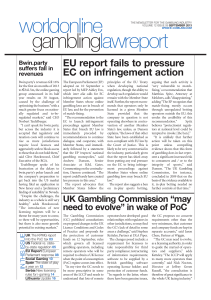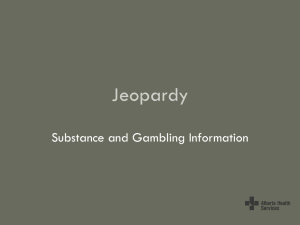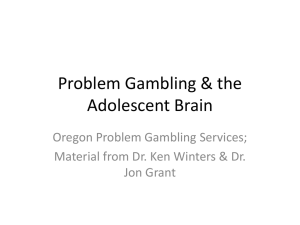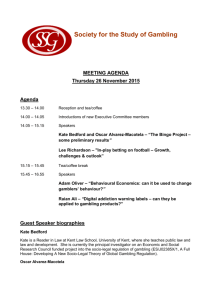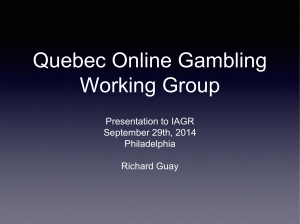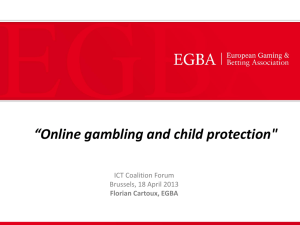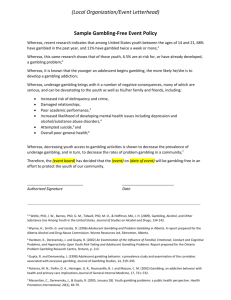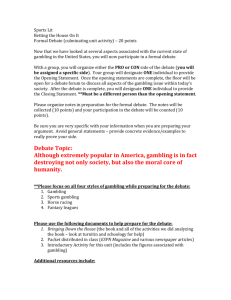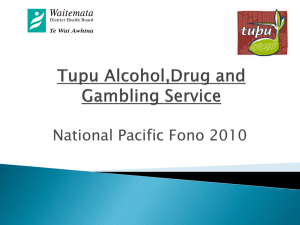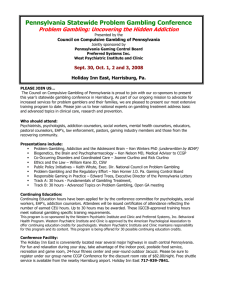Slides Philippe Vlaemminck
advertisement
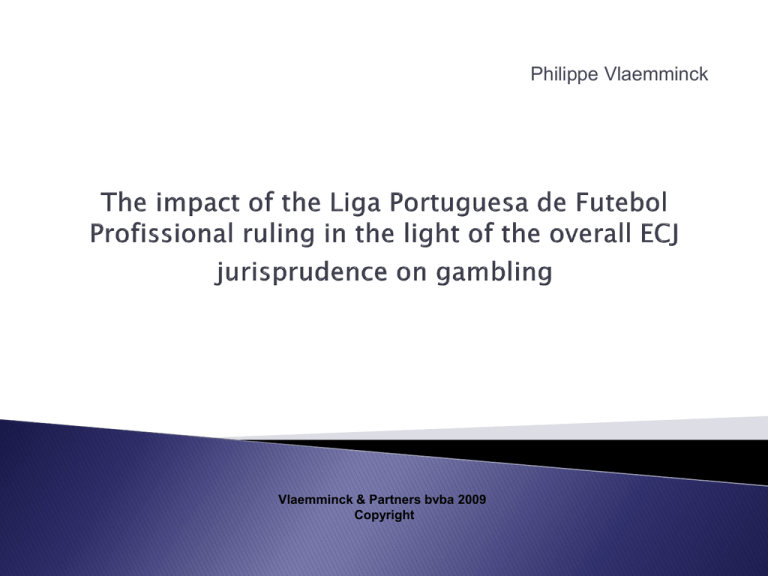
Philippe Vlaemminck Vlaemminck & Partners bvba 2009 Copyright Schindler case: C-275/92 Läärä case: C-124/97 EFTA Ladbrokes case: E-3/06 Moral, religious and cultural considerations attached to lotteries Justify wide margin of discretion for Member States to determine what is required to protect players and to maintain order in society: Manner in which lotteries are operated Size of the stakes Allocation of profits Extent of protection: MS can decide whether it is necessary totally or partially to prohibit activities or merely to restrict them Mere fact that MS has opted for a system of protection which differs from that adopted by another MS cannot affect the assessment of the need for, and proportionality of the provisions enacted. Provisions must be assessed solely by reference to objectives pursued by the MS concerned and the level of protection it intends to provide This case law doesn’t allow a country of origin approach! in case the restrictions maintained are found to be lawful: MS has the right to ban the cross border promotion and provision of games of chance, no matter whether they are lawful in the state of origin or not Even if restrictions are found to be unlawful, MS can still require a national license in view of the possible differences in the level of protection desired in the MS concerned (par. 59) EFTA Court has not accepted the application of the principle of mutual recognition, as was brought forward by Ladbrokes Par.85: “even if the legislation and practice in the home state of the operator ensures a high level of protection in relation to the sociological features characterizing that state, this may not necessarily amount to the same level of protection with respect to the features characterizing the state where the services are to be provided” ECJ confirmed its previous case law in Schindler, Läärä, etc by acknowledging yet again the discretionary power of the MS in the field of gambling ECJ extended its previous case law on the validity of an exclusive right in the gambling sector to an exclusive right system regarding the online provision of gambling services Par 67: ECJ acknowledges that the grant of exclusive rights to operate games of chance via the internet to a single operator, which is subject to strict control by the public authorities, may, in circumstances such as in the proceedings, confine the operation of gambling within controlled channels and be regarded as appropriate for the purpose of protecting consumers against fraud on the part of the operators. Most important achievement=ECJ explicitly denied application of principle of mutual recognition in the gambling sector (par 69): in the absence of Community harmonization, a Member State is entitled to take the view that the mere fact that an operator such as Bwin lawfully offers gambling services via the internet in another Member State, in which it is established and where it is in principle already subject to statutory conditions and controls on the part of the competent authorities in that State, cannot be regarded as amounting to a sufficient assurance that national consumers will be protected against the risks of fraud and crime, in the light of the difficulties liable to be encountered in such a context by the authorities of the Member State of establishment in assessing the professional qualities and integrity of operators. Impact? End of gambling hubs like Malta and Gibraltar! Competent authorities in MS of establishment cannot sufficiently guarantee the integrity and professional quality of operators providing their services in another MS MS of residence of the consumer can maintain its own restrictive conditions and can legitimately prohibit or restrict the access to their territory for operators established in other jurisdictions Answer to preliminary question doesn’t leave any room for Interpretation and proportionality assessment: “ article 49 EC does not preclude legislation of a Member State, such as that at issue in the main proceedings, which prohibits operators such as Bwin, which are established in other Member States, in which they lawfully provide similar services, from offering games of chance via the internet within the territory of that Member State Breakthrough ruling: ECJ didn’t refer matter back to national judge for interpretation in this specific case – ruled itself that MS is entitled to prohibit the provision of online gambling services within its territory by an operator established in another MS ECJ ruling in Liga Portuguesa de Futebol Profissional case is not an isolated ruling: it follows the line of the previous case law related to gambling services This time the ECJ denied the application of the principle of mutual recognition in an explicit way! Impact on all national restrictive regimes, not only limited to Portugal! Guideline for political debate on gambling within EU institutions: no country of origin approach can be accepted! Thank you for your attention! Vlaemminck & Partners bvba IT Tower Avenue Louise 480 (5th floor) 1050 Brussels Tel + 32 9 787 97 10 Fax + 32 2 787 97 19 Ph.Vlaemminck@Vlaemminck.com www.vlaemminck.com
